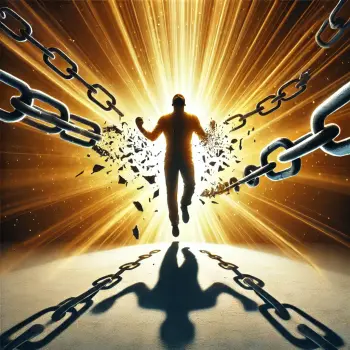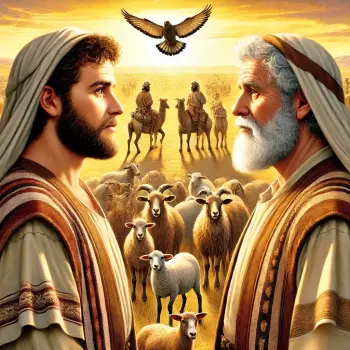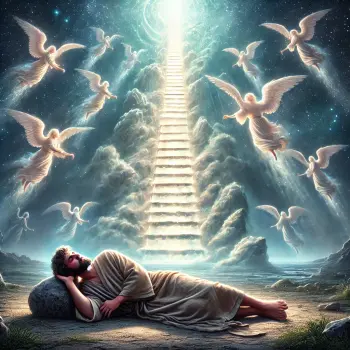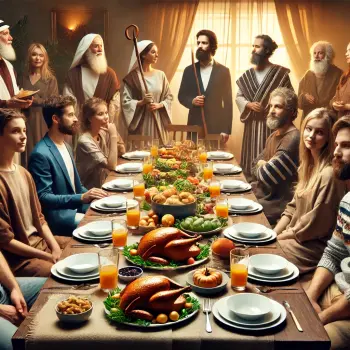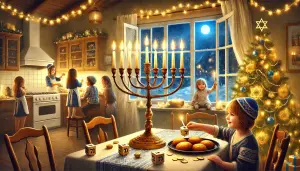
“When is the Jewish Christmas this year?” How many times have all of us heard that question or some variant over the course of our lifetimes? Sometimes I begin to explain the differences between Christmas and Chanukah; other times I simply respond, “This year Chanukah begins on the night of December 25.” To the casual observer the observance of the two holidays seems similar. They’re both solstice celebrations that have been adapted to fit different historical circumstances: the birth of Jesus in one case and the rededication of the Temple by the Maccabees in the other. Both use light as a prominent symbol. And both have come to be seen as the fulfillment of the hopes and dreams of the retail sector of the economy.
Minor Holiday
Chanukah, though, is a minor holiday. No forms of work are forbidden on Chanukah. There is no tractate in the Talmud devoted to Chanukah, just a brief mention in Tractate Shabbat concerning appropriate wicks and oils and whether to light eight candles on the first night and decrease or one on the first night and increase. Also, Chanukah requires no lengthy preparation period. Cleaning and cooking for Pesach can take weeks. Putting up a Sukkah can take hours or even days depending on the skills or lack thereof of those assembling. Chanukah only requires that you find the chanukiah and the matches and buy a box of candles.
Finally, if Chanukah were truly important, Jewish composers would have devoted more time to “I’m dreaming of Chanukah, just like ones on the Vishtula”; or “Chestnuts roasting on an open flame, Tante Rivkah pinching on your cheek”; or “It’s the most wonderful time of the year, there’ll be parties for hosting, and dreidel winners boasting”. Instead we’re left with “I have a little dreidel” and “O Chanukah, O Chanukah”.
Chanukah’s Origin
Chanukah literally means dedication or rededication and refers to the rededication of the Temple during the time of the Hasmoneans. After an internal conflict between assimilationists who wanted to be closer to the Greek culture of the Seleucids and those who were traditionalists, the Seleucids were drawn into the conflict. War raged for many years and eventually a truce was reached giving the Judeans a degree of autonomy, while still being under the control of the Seleucid empire,
The observance of Chanukah was decreed in celebration of the rededication of the Temple, which had become desacralized by offerings to foreign gods. The dedication ceremony mirrored the original dedication of the Temple under Solomon during the festival of Sukkot, a period of 8 days. The first Chanukah was both a delayed observance of Sukkot and a festival of dedication. At the time, it seemed uncertain whether it had enough staying power for its observance to continue beyond the end of Hasmonean rule or beyond the destruction of the Temple.
But it did. Over the years different people and groups chose to emphasize various aspects of the holiday. For many, the story of the cruse of oil that lasted for 8 days became central to celebration. For others, an emphasis on Jewish sovereignty was most important. Still others took comfort in the victory of the few over the many. The story is broad enough to enable everyone to place their personal perspective on the celebration.
When Jews lived in insular Jewish communities, Chanukah remained a small holiday with some fun and entertainment for children and the opportunity for adults to raise their cholesterol levels to record heights seeing how many different fried foods they could consume over the course of 8 days. Integration of Jews into the mainstream of American society and proximity to Christmas pushed the minor holiday into much greater prominence.
Chanukah’s Importance Today
But is it still a minor holiday? I don’t mean that it looms larger in popular culture, but that it fulfills a role of real importance in Jewish life. I believe that it does.
During a season in which it is impossible to stroll through a mall or a store, turn on the radio, or scroll through a TV guide without hearing or seeing something related to Christmas, celebrating Chanukah becomes a point of Jewish pride and a salute to Jewish identity. Much like the origins of Chanukah, contemporary celebrations are an acknowledgement of Jewish particularism within a larger culture that emphasizes different practices and values. Most importantly it marks the persistence of Jewish identity.
The rise in anti-Semitism here and around the world and the painting of Israel as a pariah state make it easier and for some, more desirable to fade into the woodwork, disappear, and avoid dealing with the ugliness of conflict. Celebrating Chanukah is a reminder not only of our history and our persistence, but also that we are always passing that flame on to a new generation. May our celebration of the festival of lights this year be both meaningful and joyful.







